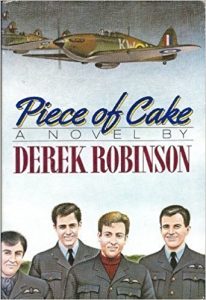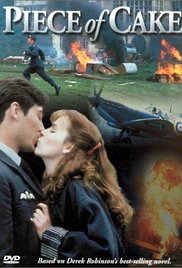I’m kicking off a new feature! Screen to Screen looks at adaptations, specifically from book (an e-book screen, get it?) to movie/TV/game or vice versa, comparing the strengths and weaknesses of each. With the release of Dunkirk, today’s inaugural edition about Piece of Cake is for anyone interested in events that preceded and followed Dunkirk – The Battle of France and The Battle of Britain.
When Derek Robinson released his novel, Piece of Cake, in 1983, it caused a bit of a stir for its “revisionist” take on the Battle of Britain. My own first encounter with this story came with watching the TV mini-series adaption in 1988. More recently, I finally read the source novel and re-watched the mini-series. I was struck by the fact that despite closely following the storyline of the novel, the TV adaptation makes some important changes that benefit the new medium. Both versions have been very influential in their own way as I began to write the Aelita’s War series.
The Story:
Piece of Cake follows an RAF fighter unit, Hornet Squadron, from the run up to WWII, through deployment to France, the retreat after Dunkirk and culminates the Battle of Britain, in 1940, when Hitler’s planned invasion of Britain was thwarted. Although the novel is memorable for its lively ensemble of characters, the story is not character-driven. In fact, the whole thesis of the book is that the RAF’s role in defeating Hitler’s invasion plans was exaggerated (a point the author drove home in an afterword in the edition that I read). The Royal Navy’s supremacy, Robinson believes, meant there was never a serious chance of an invasion happening.
 This went against one of the modern myths of Britain, that of The Few. Winston Churchill’s famous speech during the Battle of Britain (“Never in the field of human conflict was so much owed by so many to so few”) is even mocked by the characters. Further demythologizing the pilots, it flips their depiction from the knights of the air of popular imagination into bunch of sociopathic killers. The novel does not revel in gore or tragedy. It brings focus to the costs of war and in doing so, actually elevates the contributions that the real pilots made. Christopher Nolan has said that when making Dunkirk, taking the myth out of the story actually makes the real events more impressive. Robinson tapped into that same current three decades previously.
This went against one of the modern myths of Britain, that of The Few. Winston Churchill’s famous speech during the Battle of Britain (“Never in the field of human conflict was so much owed by so many to so few”) is even mocked by the characters. Further demythologizing the pilots, it flips their depiction from the knights of the air of popular imagination into bunch of sociopathic killers. The novel does not revel in gore or tragedy. It brings focus to the costs of war and in doing so, actually elevates the contributions that the real pilots made. Christopher Nolan has said that when making Dunkirk, taking the myth out of the story actually makes the real events more impressive. Robinson tapped into that same current three decades previously.
It’s easy to see why the book courted controversy at the time. By comparison, the mini-series blunted many of its edges. Coming out a decade before Saving Private Ryan shifted modern depictions of war, it’s relatively sanitized compared to modern works. Still, it is enthralling to watch a combat unit at play and at work, the characters alternately clashing and coming together under enormous stress.
Differences between the two
- The show removes some subplots from the novel, particularly one involving an American reporter.
- In the novel, the squadron flew Hurricanes. For technical reasons, the TV production used Spitfires, which also have a sexier image.
What the book does well
- A very high level of historical accuracy
- The written passages of combat are better at showing the violence and urgency in the air, compared to the relatively staged feeling of television scenes
- There is more in depth to the undercurrents of British classism
- It is more unsentimental and truer to life than the mini-series, which can hardly avoid sentimentality with its beautiful production, score and charismatic actors
What the mini-series does well
- The novel takes on a lecturing tone, with some clumsy exposition about the bigger picture of the Battle of Britain and tactical discussions on air combat
- The excised subplots felt incomplete and out of place in the novel
- It has a better handle on its characters, who feel more lively than the book’s, thanks to a standout performance by Neil Dudgeon (now Inspector John Barnaby to Midsomer Murders fans… yes I’m one of them)
- That score – seriously when I listen to this, I feel like I’m soaring over the White Cliffs of Dover
I don’t like playing the game of saying one is better than the other when comparing books and their adaptations, especially when both have merits on their own. Both bring different qualities to the table. However, they recommend themselves to somewhat different audiences. The mini-series is great for those with a general interest in history and ensemble driven dramas. The book, with its digressions into military studies, seems more appealing to students of the topic and might be less enthralling for casual readers. I’m interested in both, so I found them to be excellent complements to each other.